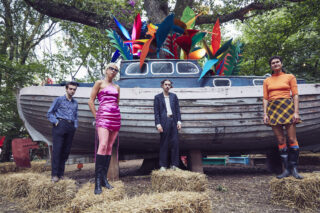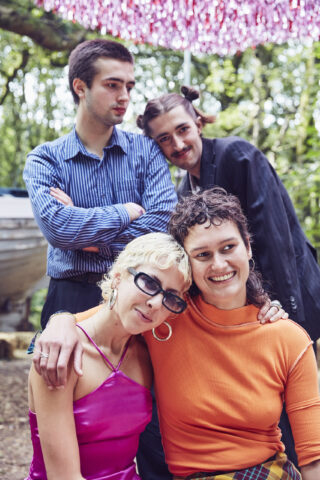Hogs and grapes, boiler suits and combat boots: it’s The Umlauts
Get to know the art-punk troupe who are resisting dystopia

Get to know the art-punk troupe who are resisting dystopia
“‘Tight and comfy.’ That’s what we’re going for,” Oliver Offord declares out of the blue. As if to force home his point, he’s pointing his finger straight at me. Taken aback by the sudden non sequitur, I glance quizzically at the three other people gathered around the log that’s functioning as a makeshift conference table, deep inside the Wiltshire countryside.
Vocalist Annabelle Mödlinger smiles helpfully and puts me back in the picture. “Our first group trip was to a mountain near my hometown. As part of it, I hired this ski instructor, and let’s just say he was the most Austrian bloke in the entire world. His catchphrase for the trip was, ‘You need your boots to be tight and comfy.’”
“We were crap!” says Alfred Lear, almost apologetically. “All I remember was having to do that snowplough thing all the way down the mountain. From a distance, it must’ve looked very sad and very slow. Still, it was a good leg workout.”
It’s a confusing moment, but it’s a great window into the group dynamics that drive The Umlauts. On stage, the band might appear to be be a rotating cast of players – a weirdly-dressed crowd, looking faintly like a GCSE music class in full swing – but at the core is the four people who’ve joined me here, next to this ship that’s marooned in the middle of a forest at End of The Road festival.
Joking around and finishing each other’s sentences, The Umlauts come across like four friends at a festival, and it’s actually hard to believe that their individual backgrounds read like a location list for a James Bond movie. Mödlinger hails from the Austrian Alps, while Maria Vittoria Faldini, her fellow vocalist, calls Monaco home. In almost total contrast, Offord and Lear’s roots stem from the sleepy Gloucestershire market town of Stroud, and it could be said that the earliest iteration of The Umlauts started there. Holed up in the town’s SVA arts space, this formative period might not have resulted in anything tangible but sparked a fascination with synthesisers, the DNA of the group’s sound.
It took a move to London and several hazy jam sessions over a kitchen table in Peckham for something that could be recognised as The Umlauts began to coalesce. “We were lucky that we had very appeasing neighbours,” shrugs Lear, recounting those early sessions in their student flat. “Me and Alf were making a lot of recordings as part of a project we were doing. Actually, I think ‘project’ makes it sound like we’d thought it through – we hadn’t. It was almost like comedy; we were just making stuff up. I’m not really sure how it happened; we got a bit drunk, but we realised that we actually had something that sounded good, and it was then that we both decided ‘let’s make it into a proper song.’”
The group’s sound crystallised further when the duo met Mödlinger and Faldini at Wimbledon Arts College. Adding international styles and perspectives into the equation, their vocals switch effortlessly between German, English, French and Italian, bringing a level of detached surrealism to the band’s output.
“It was very spontaneous,” says Faldini, recalling the band’s first practice as a four-piece. “Words were already a big part of our practice, and getting those things into the music came quite naturally. It didn’t seem strange or unknown at all.”
The result of these sessions is the band’s debut EP, Ü. Recorded at Margate’s PRAH studios and released in June on the very same label, it’s a tightly hewn mix of mechanical synth-pop, spiky no wave and bristling post-punk. The six songs show off a band able to juggle contradictions with ease, recalling both the disorientating melodies of first-generation post-punk bands like X-Ray Spex and Cabaret Voltaire yet retaining enough in the way of structure and pop sensibility to keep things dancefloor-friendly.
“We appreciate all kinds of music,” explains Lear when I ask about the band’s influences. “I don’t think we’ve ever tried to pinpoint the influences because they don’t always come from music. If you had to press me, I think bands like The Fall, even though it doesn’t seem that clear that they’re in there. We’re all big fans of Björk, and we all love The Knife…”
“There’s also been a lot of German music,” adds Mödlinger with a knowing smile. “We definitely bonded over a lot of Can, Malaria and Kluster back when we were first jamming. I think you could definitely say that it’s had an influence.”
One thing that becomes quickly apparent is how much The Umlauts are a collaborative effort. Each song has been treated almost like a conversation between each band member, and it gives their tracks a strange aura of artistic tension. Listening through the EP is like tuning into a podcast series. The band tackle a subject through duelling synths, metaphors and deadpan lyricism in the same way a group tutorial might discuss their way through a topic – unpacking the concepts, analysing the themes and hopefully arriving at a conclusion.
The process is most apparent on the band’s first single, ‘Boiler Suits and Combat Boots’. Sounding like a combination of Kraftwerk and The Human League and sporting a cover that is pure Tangerine Dream, you’d be forgiven for taking it as a well-meaning pastiche. But dig into the lyrics a bit, and it’s actually doing something pretty clever. The harsh, mechanical rhythms and hypnotically repeating synth lines are, in fact, merely set dressing for a darkly humorous takedown of conformity. It’s a track that the band describe as a vision of a world lost in ‘dystopian uniformity’.
When I ask about the background to the song, Mödlinger starts out dismissively. “It was almost like, let’s do a Kraftwerk piss-take. The boys already had the title, so I wrote the song at our practice. Basically, I blurted out whatever lyrics came into my mind at the time.”
“I guess it’s kind of about thinking about the world around us,” she continues, digging a little deeper. “I wanted to ask the question why we all wear our uniforms, because we all do. I find it weird how we all fear this creeping monoculture yet play a part in creating it. We all went to art school, but we’re just as guilty as anyone else. The art world likes to think of itself as somehow outside of society, but it’s just another segment in a way. Whoever you are, we all follow trends.”
‘Energy Plan for the Western Man’, the band’s follow-up, similarly explores dystopian concepts through synthetic texture and monotone vocals. Its title is from a work by German performance art pioneer Joseph Beuys; the original aspired to provoke an open and honest discussion between artist and audience. The Umlauts, though, have deliberately inverted the meaning. “I remember being more struck by the title,” Mödlinger tells me. “It made me think about Western men in general and how, as a society, we’ve created a group of people who lack empathy.”


Many acts would be taking it easy with two well-received singles and an EP doing the rounds, but The Umlauts seem like they’re itching to change things up. A summer’s worth of festival appearances and club shows seem to have left the group brimming with confidence and sporting the potential energy of an elastic band, with the four creative members poised and ready to travel in all sorts of strange and unusual directions.
Faldini, especially, seems hyped at the prospect of tipping yet more ingredients to the brew. “I’m really keen to start bringing disco and Italian pop into the mix. It’s fun to play around with and merge all these worlds together. It gives us a much more open canvas to play with, and, like, a lot more space to play around with, both emotionally and musically.”
“We’re spending a bit more time planning what we want to do, and that can only be a good thing,” adds Lear. The last record was made under all this uncertainty, and our only real ambition was making something that would work, so this second record should be about flexing. I want to test out the boundaries and see what we can really do.”
“The next record is definitely going to be a lot different,” nods Offer in agreement. “This next one is going to be properly hedonistic; it’ll be like finding a huge table covered in hogs, grapes and all sorts of delicious things.”